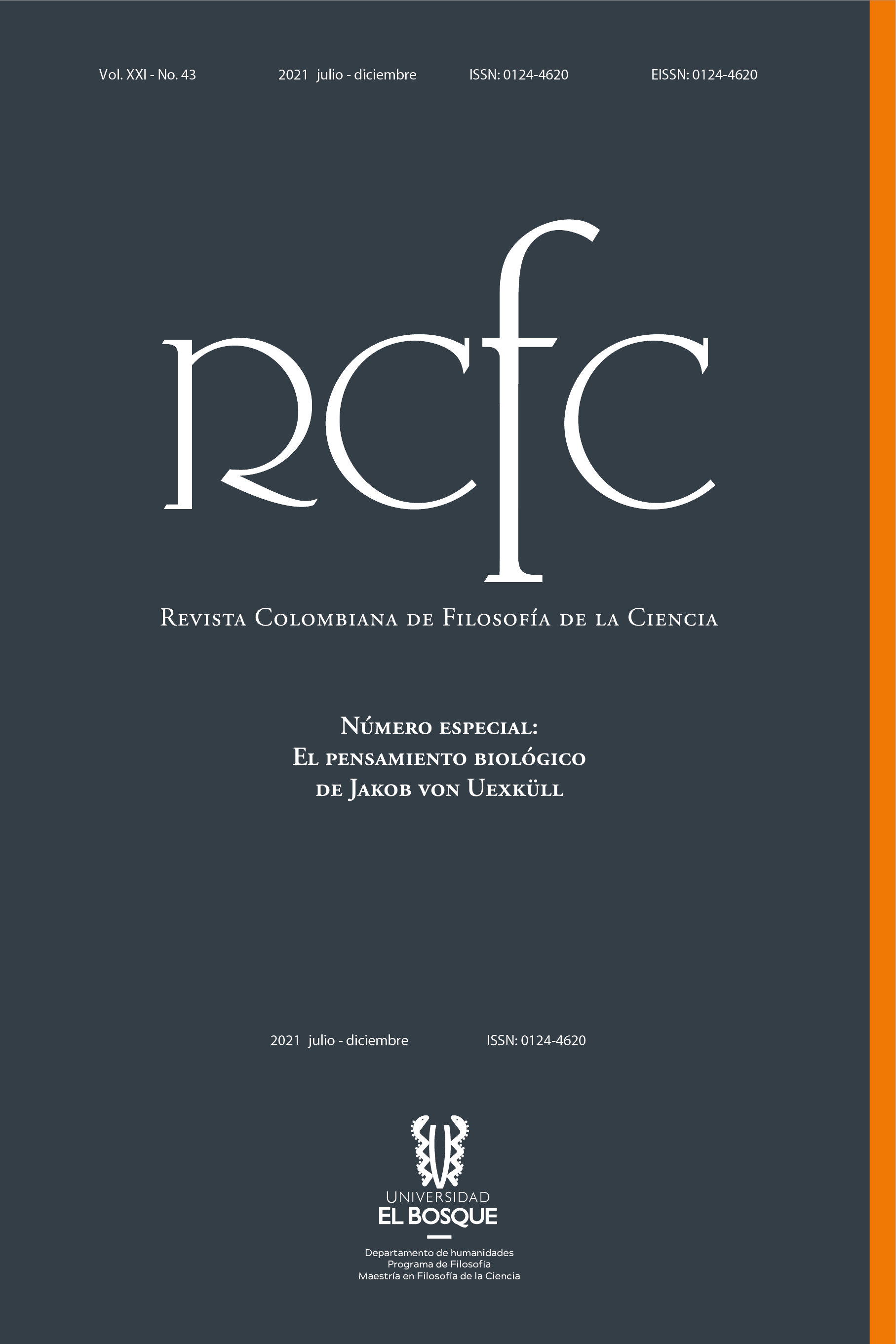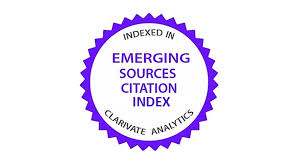Jakob von Uexküll’s Kantian Biology
DOI:
https://doi.org/10.18270/rcfc.v43i21.3452Keywords:
Uexküll, Kant, Biology, Epistemology, Organism, Experience, SubjectAbstract
As proposal, the paper seeks to show in what sense Uexküll’s theoretical biology expands principles of Kantian epistemology: the idea that the cognitive structure referring to the organization of sensory experience is not restricted to human being and would also include non-human organic forms. From a methodological point of view, Uexküll lays the foundation for a general theory of organism that combines elements of Kantian epistemology and physiological observations. As strategy for the development of this paper, particularly, we will explore the continuity between the Kantian foundation of theoretical biology (1926) and Umwelt theory (1934).
Downloads
References
Berthoz, Alain., y Petit, Jean-Luc. Phénoménologie et Physiologie de l'Action. Paris: Odile Jacob, 2006.
Brentari, Carlo. Jakob von Uexküll: The Discovery of the Umwelt Biosemiotics and Theoretical Biology. Dordresch: Springer, 2015.
Bruner, Jerome. Actual Minds, Possible Worlds. Harvard: Harvard University Press, 1986.
Descartes, René. El Tratado del Hombre [1664]. Madri: Alianza Universitária, 1990.
Fechner, Gustav Theodor. Elements of Psychophysics 1966. Vol. I, Trad. H.E. Adler. New York: Holt, Rinehart & Winston.
Gibson, James J. The Ecological Approach to Visual Perception. Boston: Houghton-Mifflin, 1979.
Goodman, Nelson. Way of Worldmaking. Indianapolis: Hackett, 1978.
Griffin, Donald R. Animal Minds. Chicago: Chicago University Press, 1992.
Heidelberger, Michael. Nature from within. Eds. Gustav Theodor, Fechner and His Psychophysical. Trad. Cynthia Klohr. Pittsburgh: University of Pittsburgh Press, 2004.
Hoffe, Otfried O. Immanuel Kant. São Paulo: Martins Fontes, 2005
Johnson, Mark. The Body in the Mind. Chicago: Chicago University Press, 1990.
_____. Embodied Mind, Meaning, and Reason. Chicago: The University of Chicago Press, 2017.
Kant, Immanuel. Crítica da faculdade do juízo. Rio de Janeiro: Forense Universitária, 1993.
Koutroufinis, Spyridon, “Modern Biological Neo-Teleologism vs. Aristotle’s Genuine Telos”. Biocosmology – Neo-Aristotelism 6.3/4 (2016): Online.
Kull, Kalevi. “Jakob von Uexküll: An Introduction”. Semiotica 134.1/4 (2001): 1-59. <https://doi.org/10.1515/semi.2001.013>
Marcus, Solomon. “On the Logical and Semiotic Status of Jakob von Uexküll’s Concept of Umwelt”. Semiotica 134–1/4 (2001): 201–210.
Mayr, Ernst. Towards a New Philosophy of Biology. Cambridge, MA: Harvard University Press, 1988.
Menary, Richard. “Introduction to the special issue on 4E cognition”. Phenom Cogn Sci 9.4 (2010):459–463
Merleau-Ponty, Maurice. A Natureza – curso do Collège de France. São Paulo: Martins Fontes, 2000.
Newen, Albert, de Bruin, Leon De. and Gallagher, Shaun. The Oxford Handbook of 4E Cognition. Oxford (UK): Oxford University Press, 2018.
O’Neil, Joseph. “Translator’s Introduction”. Uexküll, J. von. A Foray into the Worlds of Animals and Humans. Minniapolis: Minniapolis University, 2010.
Stewart, John. “Foundational Issues in Enaction as a Paradigm for Cognitive Science”. Enaction – Toward a New Paradigm for Cognitive Science. Ed. Stewart, J.; Gapenne, O. Di Paolo, E. Cambridge: The MIT Books, 2010.
Thom, René. Paraboles et Catastrophes – Entretiens sur les mathématiques, la science et la philosophie. Paris: Flammarion, 1983.
Thompson, Evan., y Stapleton, Mog. “Making Sense of Sense-making: Reflections on Enactive and Extended Mind Theories”. Topoi 28.1 (2009): 23–30. <https://doi.org/10.1007/s11245-008-9043-2>
Uexküll, Jakob von. Theoretical Biology. London/New York: K. Paul, Trench, Trubner & Co. ltd., Harcourt. Brace & company, inc., 1926
______. Dos animais e dos homens 1934. Lisboa: Edições Livros do Brasil, 1982.
______. Ideas para una concepción biológica del mundo. Buenos Aires: Espasa Calpe, 1945.
Uexküll, Thure von. A teoria da Umwelt de Jakob Von Uexküll. Galáxia – Revista Transdisciplinar de Comunicação, Semiótica e Cultura, São Paulo: Educ, n. 7, p. 19-48, 2004.
Vaidman, Lev, “Many-Worlds Interpretation of Quantum Mechanics”, The Stanford Encyclopedia of Philosophy (Fall 2018 Edition), Edward N. Zalta (ed.), URL = <https://plato.stanford.edu/archives/fall2018/entries/qm-manyworlds/>.
Whitehead, Alfred North. Symbolism, Its Meaning and Effect. New York: Macmillan, 1927.
______. Science and the modern world. New York: Pelican Mentor Books, 1948.
William, James. The Pluralistic Universe. New York: Longmans, Green, And Co., 1909.
Wolfe, Charles T. Do organisms have an ontological status? History and Philosophy of the Life Sciences 32.1 (2010): 2-3.
Downloads
Published
How to Cite
Issue
Section
License

This work is licensed under a Creative Commons Attribution-NonCommercial-NoDerivatives 4.0 International License.

| Article metrics | |
|---|---|
| Abstract views | |
| Galley vies | |
| PDF Views | |
| HTML views | |
| Other views | |











